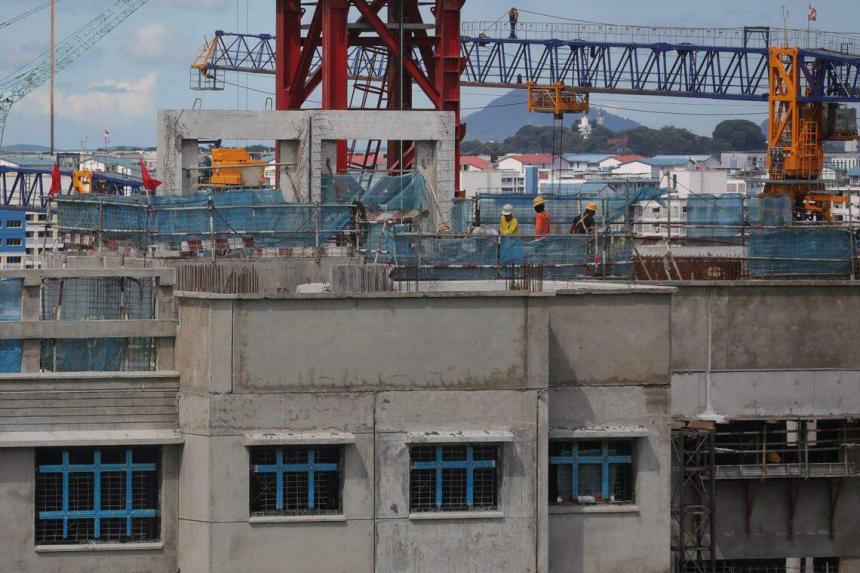SINGAPORE - A multi-agency workplace safety task force on Tuesday announced a slate of measures to strengthen safety practices, especially in high-risk industries such as construction, manufacturing and marine.
Comprising political office holders from the Manpower, Transport, National Development and Trade and Industry ministries, the task force will implement measures within about six months to a year, in a bid to improve safety at the workplace.
Here are some of the key measures announced at the National Workplace Safety and Health Campaign 2023.
Tightening construction procurement requirements
More stringent safety requirements will be introduced for public-sector construction projects.
Requirements that could be implemented include disqualifying contractors with a poor safety record from participating in tenders, introducing a minimum safety weightage for tender evaluation and giving bonus points during evaluation to firms with good safety performance.
Senior Minister of State for National Development Tan Kiat How will consult the industry on the new requirements before the Government announces details and when it will be rolled out.
Targeting the
manufacturing sector
The fatal and major injury rate for the manufacturing sector has worsened in recent months, exceeding that of the construction industry – which typically posts the highest incident figures.
From September 2022 to March 2023 for major injuries, and from September till now for deaths, the manufacturing sector’s combined incident rate per 100,000 workers is 39.3, compared with 34.5 for the construction industry.
To stem the spate of incidents, a demerit point system that is currently in place for the construction sector will be extended to the manufacturing sector by October 2023.
Under the system, companies that accumulate sufficient demerit points for safety contraventions will be temporarily banned from hiring new foreign employees for between three months and two years.
Minister of State for Trade and Industry Alvin Tan will announce more details when they are ready.
Video surveillance at
construction sites
Video systems will be deployed at construction sites for projects valued at $5 million or more from June 2024.
Comprising a network of cameras, monitors or display units, and recorders, the video systems will – apart from surveillance – be used to identify workplace safety and health risks, facilitate incident investigations and deter unsafe behaviour.
The authorities said the systems will be required at construction sites where high-risk activities take place, and firms will bear the cost of implementing them. More details will be announced when ready.
Safety course for CEOs
Chief executives or board directors of all companies in several high-risk industries – construction, manufacturing, marine, and transport and storage – will be required to attend a workplace safety and health programme on a one-off basis from March 2024.
Should serious injuries or fatalities occur, chief executives will also be required to personally account to the authorities for lapses and see through the rectifications. This was implemented in September 2022, and 16 chief executives and top management have had to answer for lapses since then.
Since mid-June 2022, companies with cases of major injuries, or those issued stop-work orders for safety contraventions, have had to engage external auditors to review their safety processes. This requirement will remain.
Support for SMEs
The Manpower Ministry noted that in recent months, small and medium-sized enterprises (SMEs) in the construction, manufacturing, and transport and storage industries have had higher death and major injury rates compared with other firms.
From June, firms will be given more resources – such as bite-sized guides – via existing SME centres to improve their safety processes and capabilities. There will be more efforts to inform SMEs about capability-building programmes such as StartSafe, a free initiative that helps firms identify safety risks.
More training for workers
From January 2024, an online learning component will be introduced to the safety orientation course re-certification assessment, which workers in high-risk industries have to undergo periodically.
The Ministry of Manpower (MOM) said the online learning component, which workers will take once every two years, will include modules based on high-risk activities such as working at height and vehicular safety.
The roll-out of this online component will begin with the construction sector before being expanded to the marine and metalworking sectors.
Expanded task force
The multi-agency workplace safety task force – which was formed last October and currently comprises Senior Minister of State for Manpower Zaqy Mohamad, Senior Minister of State for Transport Amy Khor, Mr Tan Kiat How and Mr Alvin Tan – will be expanded.
By end-2023, representatives from the Ministry of Health and labour movement, and industry leaders will be added to the task force so that workplace safety and health can be addressed more holistically across various industries.
Machinery, combustible dust and noise
By June 2024, legal duties on manufacturers and suppliers of more types of industrial machines, equipment and hazardous substances will be in place.
Organic combustible dust will have to be properly labelled, and users of combustible dust will have to notify MOM and building owners or landlords if their usage hits prescribed amounts.
All companies identified to have higher noise risks are required to conduct workplace monitoring and send their workers who are exposed to excessive noise for annual audiometric examinations.
This will help reduce noise-induced deafness through early detection of overexposure.


